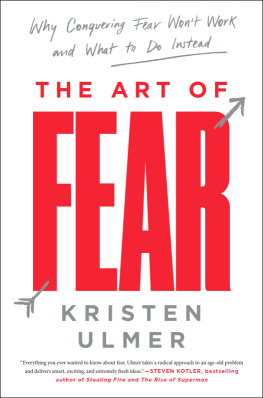Contents
Guide
Pages

Society of Fear
Heinz Bude
Translated by Jessica Spengler
polity
First published in German as Gesellschaft der Angst Hamburger Edition HIS Verlagsges. mbH, Hamburg, Germany, 2014. This translation from German is published by arrangement with Hamburger Edition.
This English edition Polity Press, 2018
The translation of this work was supported by a grant from the Goethe-Institut.

P. vi: excerpt from The Waste Land from T.S. Eliot, Collected Poems 19091962. Reprinted throughout world excluding the US in print format and the world in ebook format by permission of Faber and Faber Ltd. Reprinted in print format in the US by permission of Houghton Mifflin Harcourt Publishing Company. All rights reserved. Copyright 1936 by Houghton Mifflin Harcourt Publishing Company. Copyright renewed 1964 by Thomas Stearns Eliot.
Polity Press
65 Bridge Street
Cambridge CB2 1UR, UK
Polity Press
101 Station Landing, Suite 300
Medford, MA 02155, USA
All rights reserved. Except for the quotation of short passages for the purpose of criticism and review, no part of this publication may be reproduced, stored in a retrieval system or transmitted, in any form or by any means, electronic, mechanical, photocopying, recording or otherwise, without the prior permission of the publisher.
ISBN-13: 978-1-5095-1953-8
A catalogue record for this book is available from the British Library.
The publisher has used its best endeavours to ensure that the URLs for external websites referred to in this book are correct and active at the time of going to press. However, the publisher has no responsibility for the websites and can make no guarantee that a site will remain live or that the content is or will remain appropriate.
Every effort has been made to trace all copyright holders, but if any have been inadvertently overlooked the publisher will be pleased to include any necessary credits in any subsequent reprint or edition.
For further information on Polity, visit our website: politybooks.com
I will show you fear in a handful of dust.
T. S. Eliot
Preface
If we want to understand a social situation, we must give a voice to peoples experiences. The public today is inundated with data on poverty risk rates, the dissolution of the middle class, the increase in depressive disorders, and declining turnout among first-time voters. But what these findings mean and how they relate to one another remains unclear.
There is no question that changes are brewing in the correlation between social structures and individual attitudes. Cognitive psychologists, behavioral economists, and neurophysiologists are therefore turning their attention to the black box of the self, which now has to mediate between these dimensions without the benefit of traditional paradigms or conventional models. The self-help books that are based on their research tout mental activation programs and physical relaxation techniques.
Sociology can play its hand here if it takes itself seriously as an experiential science. Experience is the source of evidence for empirical research and personal life praxis alike. This experience manifests itself in discourse and is based on constructs. But the point of reference for analyzing blog posts, newspaper articles, medical bulletins, or opinion polls must be the experiences that are expressed within them.
One important empirical concept in society today is the concept of fear. In this context, fear refers to what people feel, what is important to them, what they hope for, and what drives them to despair. Fears reveal the direction in which a society is moving, where the flash points are, when certain groups will mentally withdraw, and how doomsday sentiments or resentment can suddenly proliferate. Fear shows us whats wrong with us. Sociologists who want to understand society today must look to the society of fear.
Acknowledgments
I would like to thank Birgit Otte, who had the idea for this book, and Sabine Lammers, who edited the text with a steady hand.
Thank you to my wife, Karin Wieland, who saved me from fixed ideas, as always, and to my daughter, Pola, with whom I discussed the major ideas on our shared streetcar journeys.
Heinz Bude, June 2014
Fear as a principle
In modern societies, fear is an issue that affects everyone. Fear knows no social bounds. The high-frequency trader sitting in front of his computer is just as susceptible to anxiety as the deliveryman returning to his depot, the anesthetist picking up her children from kindergarten, or the model looking in the mirror. In its substance, too, fear is infinite: fear of school, fear of heights, fear of poverty, fear of heart disease, fear of terrorism, fear of losing social status, fear of commitment, fear of inflation. And fear can develop along any axis of time. We may fear the future because everything has gone so well up to this point; we may feel fear in the present because we worry about our next steps, since a decision in favor of one option is always a decision against another; and we may even fear the past if we think that something weve put behind us might rear its head again.
Niklas Luhmann, whose systems theory of functional equivalents always provides for alternatives in any situation, views anxiety as perhaps the only a priori principle in modern society about which all members of society are in agreement. It is the principle that applies absolutely when all other principles have been qualified. Anxiety can bring the Muslim woman into conversation with the secularist, the liberal cynic with the despairing human rights activist.
But no one can convince someone else that their fears are unfounded. At most, fears can only be contained and dissipated through discussion. Of course, this requires that we accept the fears of our interlocutors instead of denying them. This is a well-known therapy scenario; recognizing your own fears can make you more open and flexible, so you do not need to immediately react defensively and dismissively when fear comes into play.
Though they are obviously diffuse, the fears currently coursing through the public consciousness say something about a particular sociohistorical situation. Through concepts of fear, the members of a society come to an understanding about the conditions of their co-existence: who moves forward and who is left behind; where things break and where chasms open up; what is inevitably lost and what might yet survive. It is through concepts of fear that society takes its own pulse.
In 1932, on the eve of the Nazi era, Theodor Geiger published a classic work of social structural analysis The Social Stratification of the German People in which he describes a society dominated by fears of displacement, loss of prestige, and defensiveness. He introduces us to the characters typical of the time: the small businessmen with their burning hatred of social democratic cooperatives; the homeworkers with their tiny landholdings who have grown solitary and eccentric on account of their domestic isolation and who tend toward violent rebellion; the young secretaries with their bobbed hair who are threatened by rationalization and who dream of dashing gentlemen. There are also the miners who gain their sense of self-worth by heroicizing the dangers of their profession, and whose unionized collective interests are not so much institutionally organized and class-conscious in nature as they are comradely and professional; the petty bureaucrats who guard their tiny sliver of power all the more jealously and flaunt it all the more eagerly the more their positions are squeezed by pay grades and internal tasks; the army of young graduates who experience a decline in the value of their education, the disintegration of their status, and the exclusivity of the professional world; and, finally, the various characters from the capitalist class, between whom there is no love lost: the large-scale landowners who find capitalisms intrinsic concept of a global economy unpalatable, the











